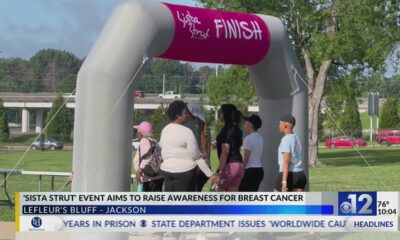Mississippi Today
Pro-Palestinian protest at University of Southern Mississippi ends without confrontation
HATTIESBURG — A pro-Palestinian protest at the University of Southern Mississippi ended after an hour, with the roughly 50 students and faculty who silently held signs facing no counter-protesters or arrests — a sharp contrast to the demonstration five days earlier at the University of Mississippi.
According to a social media post, the ad hoc group, called USM for Palestine, were calling on the university to divest if it is invested in Israeli companies, echoing demands made by students across the country in the wake of the Israel-Hamas War. A university spokesperson said information about USM's investments would not be available by press time.
“All members of the University community conducted themselves peacefully and respectfully,” Nicole Ruhnke wrote in an email.
It marked the second pro-Palestine protest at a Mississippi university since students at Columbia University set up an encampment about two weeks ago with protests touching over 40 campuses across the country. On May 2, police broke up a similar protest at the University of Mississippi after some 200 of mainly white, male counter-protesters heckled, chased and threw food-related items at pro-Palestinian students.
Videos of the Ole Miss protest went viral, and the university has said it is investigating the conduct of at least one student. The Phi Delta Theta fraternity expelled from membership a student who was filmed making monkey noises at a Black female student protester.
At USM, there are significantly less Greek students, but the specter of what could happen seemed to haunt campus officials. About 20 minutes before the protest was slated to start, the university police chief, Rusty Keyes, was already patrolling Shoemaker Square, the campus free-speech zone.
Keyes pulled aside a legal observer from the Mississippi Center for Justice to say the students would only be allowed to protest for an hour because they had not followed university policy.
“Now, I'm not happy with them,” Keyes told the legal observer. “They have to go by the rules. I have the ability to (approve) time, manner and place, okay? … That's my authority, off the policy.”
“If we're going to do this … it's going to be right there so I can protect them,” he added, gesturing to a patch of grass next to a brick building to the side of the square. “There's a lot things they could've done to make it a lot easier on theirselves (sic). And the policy works with them. But they're doing everything in their power to work against it. If they would just work, they can have everything they want. But they gotta go by the policy. That's why policies and laws are in place. It's to protect everybody. And I'm going to make sure everybody is protected.”

Then Keyes asked how many people were going to show up, before gesturing at a photographer on the other side of the fountain.
“They called this photographer, they called that photographer,” he said, “and that shows right there — I mean, what's your intent, you know?”
“Their intent is just to exercise their free speech,” the legal observer replied.
“I hope so,” Keyes said. “I hope so. I want to provide that for them. But they've got to go by my instructions for their safety, okay? And then this ends at 1 o'clock, okay? By 1 o'clock. And they gotta disperse.”
When Mississippi Today tried to talk to Keyes, he said he wasn't commenting for the university and asked a reporter to delete her recording.
A few feet away, Sirena Cantrell, the dean of students, stood with her arms crossed. Student groups aren't typically allowed to hold events during finals, she noted, so the protest wasn't fair. And she was concerned that what happened at Ole Miss could happen at USM, especially because the police were stretched thin preparing for graduation. Since the protest was silent, she hoped it would be pointless to counter-protest.
“We had actually asked the group not to do this, cause of finals weeks,” she said.
Cantrell added she had tried to talk with a student from USM for Palestine, but it wasn't productive, which was, she added, “unfortunate.”
“I didn't really have a discussion with her,” Cantrell said. “I just told her the policy, and she said ‘okay,' and then I never heard from her again.”
By 12 p.m., officers had stationed themselves at all four corners of the fountain. Police cars blocked off the sidewalks to prevent people from walking too close to the protesters.
Students wearing keffiyehs began to trickle in, holding signs that said “Save Gaza,” “Nothing Justifies Genocide” and “Humanity Above Politics.” After speaking to Keyes, they shuffled over to the grass.
The protest was so silent, chirping birds could be heard over the water fountain. So could the laughter of a group of mostly male students who stood to the side.

“Because if Israel sees their signs, they'll stop shooting at Palestine,” one of the students said to snickers. He wore a blue ball cap, a gray shirt and gave his name as Tim, then “Binky.”
Rumors about the protest had been all over social media, “Binky” said, and he had been looking forward to it. But so far, he was disappointed.
“I kind of wanted it to be wild,” he said. “I was excited to watch them look stupid.”
“I think there's no sense in yelling at each other, though,” responded his friend, who wouldn't give his name. Cantrell, he added, had told them “we can't raise havoc, just like they (the protesters) couldn't.”
“The stuff at Ole Miss got taken too far,” another added. “It was funny but like, some of the shit was way too far.”
The protest was only supposed to last an hour, someone else said, and they all started laughing again.
“That's gonna stop what's going on over there,” he said. “An hour of sign holding.”
The silent protest was an attempt to follow university policy and avoid replicating the confrontational atmosphere of Ole Miss' protest, said Willem Myers, a 22-year-old social work major who was acting as USM for Palestine's spokesperson.

Though they hadn't anticipated the Keyes' restrictions, Myers noted the mood was calmer than at a protest he attended at Tulane University in New Orleans, where police broke up an encampment and arrested 14 people, including him. Myers had to get permission to leave the city, where he lives, to be on campus that morning for an exam.
The goal was to support Palestinians, said Myers, who is Jewish. He disagrees with the idea that Israel “speaks for or is in the best interest of the Jewish people.”
“What we're seeing overwhelmingly from people who are on the frontlines and who are in Rafah is that they are emboldened by and given hope by the actions of student protesters throughout the world right now,” he said. “The fact is that we don't exist in a vacuum, we're not an island here at USM or in Mississippi. We're part of the larger U.S. imperialist project, and we are firmly standing against it … to have it on record that USM students do not stand with the ongoing genocide and violence against Palestinians.”
At 1 p.m., the protest was over. Students clapped briefly, then started packing up.
As police watched, a white student in a blue shirt walked up to them. He asked what “the rules” were and why he wasn't allowed to talk to the protesters, “because it's a public university.”
“If you want to communicate with them, wait till they leave,” Keyes responded. “We just want to keep this area safe.”
Though the student, a 23-year-old finance major who declined to give his name, was friends with the group that was making jokes, he said he actually wanted to have an open dialogue with the protesters. He would've liked to ask what their “end goal” was.
He said he already knew their answer would be a ceasefire, but he wasn't sure that was possible in the Middle East where, he said, “it's built into their culture not to like each other.”
But it's like that here, too, he said. In America, political beliefs are becoming more polarized due to “Big Tech” and misinformation. Though he identifies as a conservative, is in a fraternity and plans to vote for Donald Trump, the student said he also opposes the military industrial complex — but where else, except for a protest like this, would he have an opportunity to actually talk with people on the other side?
“I guess I do,” he said, when asked if he agreed with the protesters. “I guess I do, in a way. I think I saw a big sign that said ‘‘ceasefire.' Yeah, I do agree with that. I agree with a ceasefire. Of course. Why would I want more people to die?”
This article first appeared on Mississippi Today and is republished here under a Creative Commons license.
Mississippi Today
On this day in 1925


MAY 19, 1925

Malcolm X was born Malcolm Little in Omaha, Nebraska. When he was 14, a teacher asked him what he wanted to be when he grew up and he answered that he wanted to be a lawyer. The teacher chided him, urging him to be realistic. “Why don't you plan on carpentry?”
In prison, he became a follower of Nation of Islam leader Elijah Muhammad. In his speeches, Malcolm X warned Black Americans against self-loathing: “Who taught you to hate the texture of your hair? Who taught you to hate the color of your skin? Who taught you to hate the shape of your nose and the shape of your lips? Who taught you to hate yourself from the top of your head to the soles of your feet? Who taught you to hate your own kind?”
Prior to a 1964 pilgrimage to Mecca, he split with Elijah Muhammad. As a result of that trip, Malcolm X began to accept followers of all races. In 1965, he was assassinated. Denzel Washington was nominated for an Oscar for his portrayal of the civil rights leader in Spike Lee's 1992 award-winning film.
This article first appeared on Mississippi Today and is republished here under a Creative Commons license.
Did you miss our previous article…
https://www.biloxinewsevents.com/?p=359877
Mississippi Today
On this day in 1896


MAY 18, 1896

The U.S. Supreme Court ruled 7-1 in Plessy v. Ferguson that racial segregation on railroads or similar public places was constitutional, forging the “separate but equal” doctrine that remained in place until 1954.
In his dissent that would foreshadow the ruling six decades later in Brown v. Board of Education, Justice John Marshall Harlan wrote that “separate but equal” rail cars were aimed at discriminating against Black Americans.
“In the view of the Constitution, in the eye of the law, there is in this country no superior, dominant, ruling class of citizens,” he wrote. “Our Constitution in color-blind and neither knows nor tolerates classes among citizens. In respect of civil rights, all citizens are equal before the law. The humblest is the peer of the most powerful. The law … takes no account of his surroundings or of his color when his civil rights as guaranteed by the supreme law of the land are involved.”
This article first appeared on Mississippi Today and is republished here under a Creative Commons license.
Did you miss our previous article…
https://www.biloxinewsevents.com/?p=359301
Mississippi Today
Renada Stovall, chemist and entrepreneur
Renada Stovall sat on the back deck of her rural Arkansas home one evening, contemplating life when she had a life-altering epiphany…
“I gotta get out of these woods.”
She heard it as clear as lips to her ear and as deep as the trees surrounding her property. Stovall's job as a chemist had taken her all over the country. In addition to Arkansas, there were stints in Atlanta, Dallas and Reno. But she was missing home, her parents and friends. She also knew, she needed something else to do.
“I thought, what kind of business can I start for myself,” said Stovall, as she watered herbs growing in a garden behind her south Jackson home. Some of those herbs are used in her all-natural products. “I know when I lived in Reno, Nevada, where it's very hot and very dry, there really weren't products available that worked for me, my hair, and my skin suffered. I've got a chemistry degree from Spelman College. I took the plunge and decided to create products for myself.”

In 2018, Stovall's venture led to the creation of shea butter moisturizers and natural soaps. But she didn't stop there, and in December 2022, she moved home to Mississippi and got to work, expanding her product line to include body balms and butters, and shampoos infused with avocado and palm, mango butter, coconut and olive oils.
Nadabutter, which incorporates Renada's name, came to fruition.

Stovall sells her balms and moisturizers at what she calls, “pop-up markets,” across the state during the summer. She's available via social media and also creates products depending on what of her ingredients a customer chooses. “My turmeric and honey is really popular,” Stovall added.
“The all-natural ingredients I use are great for conditioning the skin and hair. All of my products make you feel soft and luscious. The shea butter I use comes from West Africa. It's my way of networking and supporting other women. And it's my wish that other women can be inspired to be self-sufficient in starting their own businesses.”





This article first appeared on Mississippi Today and is republished here under a Creative Commons license.
-
SuperTalk FM6 days ago
Martin Lawrence making 3 stops in Mississippi on comedy tour
-
Our Mississippi Home5 days ago
Beat the Heat with Mississippi’s Best Waterparks
-
SuperTalk FM2 days ago
State auditor cracking down on Mississippians receiving unemployment benefits
-
Our Mississippi Home6 days ago
Charlie’s U-Pik: Opening Soon for the Summer Season
-
Mississippi News Video4 days ago
Jackson has a gang problem
-
Kaiser Health News5 days ago
Medicaid ‘Unwinding’ Decried as Biased Against Disabled People
-
Local News2 days ago
Family files lawsuit after teen’s suicide in Harrison County Jail
-
228Sports5 days ago
George County Pours Runs In 6A South State Title Victory At PRC







































